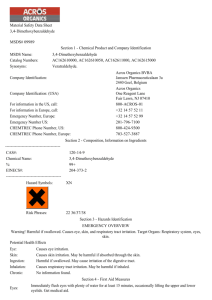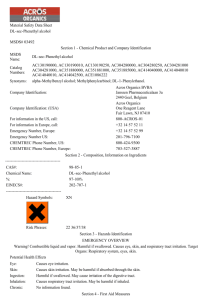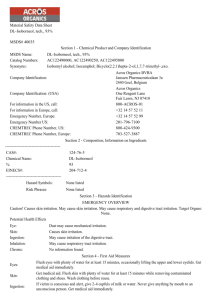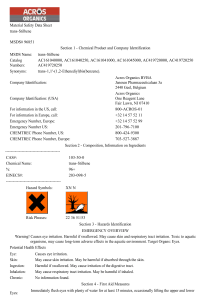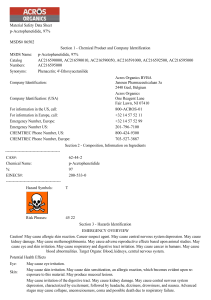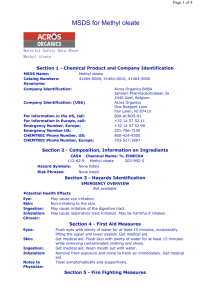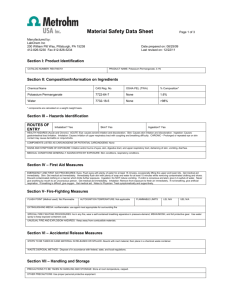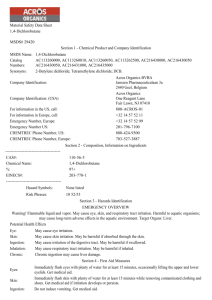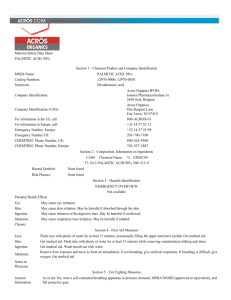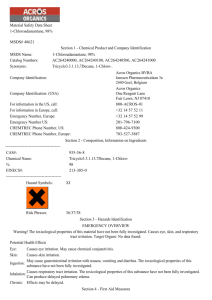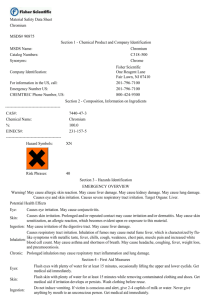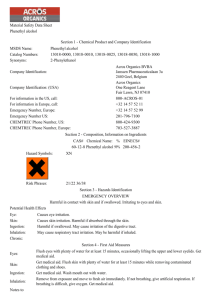Material Safety Data Sheet Acetylsalicylic acid MSDS# 00300
advertisement
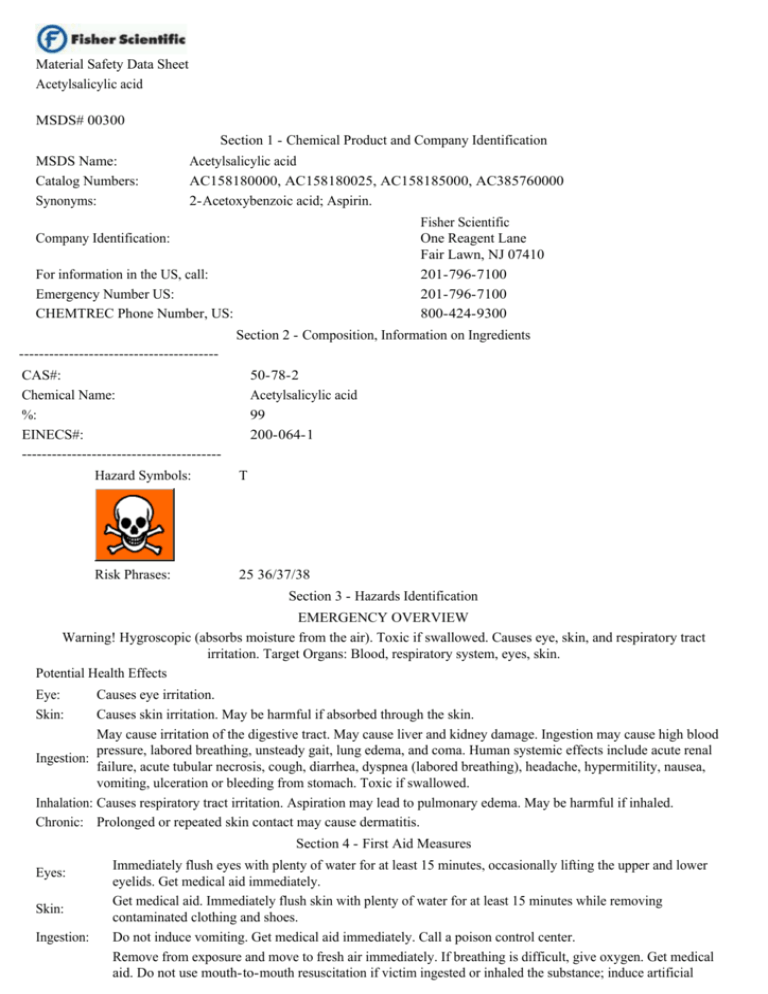
Material Safety Data Sheet Acetylsalicylic acid MSDS# 00300 Section 1 - Chemical Product and Company Identification MSDS Name: Catalog Numbers: Synonyms: Acetylsalicylic acid AC158180000, AC158180025, AC158185000, AC385760000 2-Acetoxybenzoic acid; Aspirin. Fisher Scientific One Reagent Lane Fair Lawn, NJ 07410 201-796-7100 201-796-7100 800-424-9300 Company Identification: For information in the US, call: Emergency Number US: CHEMTREC Phone Number, US: Section 2 - Composition, Information on Ingredients ---------------------------------------CAS#: Chemical Name: %: EINECS#: ---------------------------------------Hazard Symbols: 50-78-2 Acetylsalicylic acid 99 200-064-1 T Risk Phrases: 25 36/37/38 Section 3 - Hazards Identification EMERGENCY OVERVIEW Warning! Hygroscopic (absorbs moisture from the air). Toxic if swallowed. Causes eye, skin, and respiratory tract irritation. Target Organs: Blood, respiratory system, eyes, skin. Potential Health Effects Eye: Skin: Causes eye irritation. Causes skin irritation. May be harmful if absorbed through the skin. May cause irritation of the digestive tract. May cause liver and kidney damage. Ingestion may cause high blood pressure, labored breathing, unsteady gait, lung edema, and coma. Human systemic effects include acute renal Ingestion: failure, acute tubular necrosis, cough, diarrhea, dyspnea (labored breathing), headache, hypermitility, nausea, vomiting, ulceration or bleeding from stomach. Toxic if swallowed. Inhalation: Causes respiratory tract irritation. Aspiration may lead to pulmonary edema. May be harmful if inhaled. Chronic: Prolonged or repeated skin contact may cause dermatitis. Section 4 - First Aid Measures Eyes: Skin: Ingestion: Immediately flush eyes with plenty of water for at least 15 minutes, occasionally lifting the upper and lower eyelids. Get medical aid immediately. Get medical aid. Immediately flush skin with plenty of water for at least 15 minutes while removing contaminated clothing and shoes. Do not induce vomiting. Get medical aid immediately. Call a poison control center. Remove from exposure and move to fresh air immediately. If breathing is difficult, give oxygen. Get medical aid. Do not use mouth-to-mouth resuscitation if victim ingested or inhaled the substance; induce artificial Inhalation: respiration with the aid of a pocket mask equipped with a one-way valve or other proper respiratory medical device. Notes to Physician: Section 5 - Fire Fighting Measures General Information: As in any fire, wear a self-contained breathing apparatus in pressure-demand, MSHA/NIOSH (approved or equivalent), and full protective gear. Dangerous fire hazard in the form of dust when exposed to heat or flame. Extinguishing Use water spray, dry chemical, carbon dioxide, or appropriate foam. Media: Autoignition 500 deg C ( 932.00 deg F) Temperature: Flash Point: 250 deg C ( 482.00 deg F) Explosion Limits: Not available Lower: Explosion Limits: Not available Upper: NFPA Rating: health: 2; flammability: 1; instability: 1; Section 6 - Accidental Release Measures General Information: Use proper personal protective equipment as indicated in Section 8. Spills/Leaks: Vacuum or sweep up material and place into a suitable disposal container. Avoid generating dusty conditions. Provide ventilation. Do not let this chemical enter the environment. Section 7 - Handling and Storage Use with adequate ventilation. Minimize dust generation and accumulation. Do not get in eyes, on skin, or on clothing. Do not ingest or inhale. Storage: Store in a cool, dry place. Store in a tightly closed container. Handling: Section 8 - Exposure Controls, Personal Protection +-------------------- +------------------- +------------------- +----------------- + | Chemical Name | ACGIH | NIOSH |OSHA - Final PELs| |-------------------- |------------------- |------------------- |----------------- | | Acetylsalicylic aci|5 mg/m3 |5 mg/m3 TWA |none listed | | d | | | | +-------------------- +------------------- +------------------- +----------------- + OSHA Vacated PELs: Acetylsalicylic acid: 5 mg/m3 TWA Engineering Controls: Facilities storing or utilizing this material should be equipped with an eyewash facility and a safety shower. Use adequate ventilation to keep airborne concentrations low. Exposure Limits Personal Protective Equipment Wear appropriate protective eyeglasses or chemical safety goggles as described by OSHA's eye and face Eyes: protection regulations in 29 CFR 1910.133 or European Standard EN166. Skin: Wear appropriate protective gloves to prevent skin exposure. Clothing: Wear appropriate protective clothing to prevent skin exposure. Follow the OSHA respirator regulations found in 29 CFR 1910.134 or European Standard EN 149. Use a Respirators: NIOSH/MSHA or European Standard EN 149 approved respirator if exposure limits are exceeded or if irritation or other symptoms are experienced. Section 9 - Physical and Chemical Properties Physical State: Powder Color: white Odor: odorless pH: 3.5 (2.5 g/L (20C)) Vapor Pressure: 0.000003 mm Hg @ 25 deg C Vapor Density: Not available Evaporation Rate: Not applicable. Viscosity: Not available Boiling Point: Not available Freezing/Melting Point: 136 - 140 deg C Decomposition Temperature: Solubility in water: 3.3 g/L (20C) Specific Gravity/Density: 1.350 Molecular Formula: C9H8O4 Molecular Weight: 180.16 Section 10 - Stability and Reactivity Chemical Stability: Conditions to Avoid: Incompatibilities with Other Materials Hazardous Decomposition Products Hazardous Polymerization Hygroscopic: absorbs moisture or water from the air. Incompatible materials, dust generation, exposure to moist air or water. Strong oxidizing agents, strong acids, strong bases, alkalis. Carbon monoxide, carbon dioxide. Will not occur. Section 11 - Toxicological Information RTECS#: CAS# 50-78-2: VO0700000 RTECS: CAS# 50-78-2: Oral, mouse: LD50 = 250 mg/kg; Oral, rabbit: LD50 = 1010 mg/kg; LD50/LC50: Oral, rat: LD50 = 200 mg/kg; . Other: Human oral LD50 estimated at 357 mg/kg. Other references state that a 10 g dose (143 mg/kg) may be fatal in humans. Carcinogenicity: Acetylsalicylic acid - Not listed as a carcinogen by ACGIH, IARC, NTP, or CA Prop 65. Other: See actual entry in RTECS for complete information. Section 12 - Ecological Information Ecotoxicity: Other: Fish: Leuciscus idus: >1000 mg/L; 48H; LC50 Daphnia: Daphnia: 168 mg/L; 24H; EC50 Bacteria: Phytobacterium phosphoreum: 26 mg/L; 5M; EC50 Do not empty into drains. Readily biodegradable. Section 13 - Disposal Considerations Dispose of in a manner consistent with federal, state, and local regulations. Section 14 - Transport Information US DOT Shipping Name: TOXIC SOLIDS, ORGANIC, N.O.S. Hazard Class: 6.1 UN Number: UN2811 Packing Group: III Canada TDG Shipping Name: TOXIC SOLID, ORGANIC, N.O.S. Hazard Class: 6.1 UN Number: UN2811 Packing Group: III Section 15 - Regulatory Information European/International Regulations European Labeling in Accordance with EC Directives Hazard Symbols: T Risk Phrases: R 25 Toxic if swallowed. R 36/37/38 Irritating to eyes, respiratory system and skin. Safety Phrases: S 26 In case of contact with eyes, rinse immediately with plenty of water and seek medical advice. S 37/39 Wear suitable gloves and eye/face protection. S 45 In case of accident or if you feel unwell, seek medical advice immediately (show the label where possible). WGK (Water Danger/Protection) CAS# 50-78-2: 1 Canada CAS# 50-78-2 is listed on Canada's DSL List Canadian WHMIS Classifications: D1B, D2B This product has been classified in accordance with the hazard criteria of the Controlled Products Regulations and the MSDS contains all of the information required by those regulations. CAS# 50-78-2 is not listed on Canada's Ingredient Disclosure List. US Federal TSCA CAS# 50-78-2 is listed on the TSCA Inventory. Section 16 - Other Information MSDS Creation Date: 12/12/1997 Revision #12 Date 7/20/2009 The information above is believed to be accurate and represents the best information currently available to us. However, we make no warranty of merchantibility or any other warranty, express or implied, with respect to such information, and we assume no liability resulting from its use. Users should make their own investigations to determine the suitability of the information for their particular purposes. In no event shall the company be liable for any claims, losses, or damages of any third party or for lost profits or any special, indirect, incidental, consequential, or exemplary damages howsoever arising, even if the company has been advised of the possibility of such damages. --------------------------------------------------------------------------------
